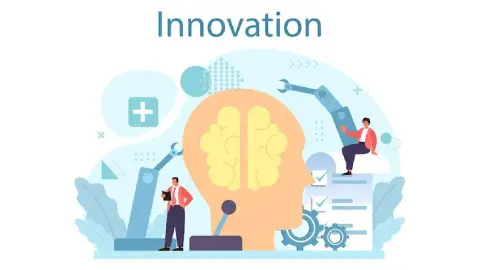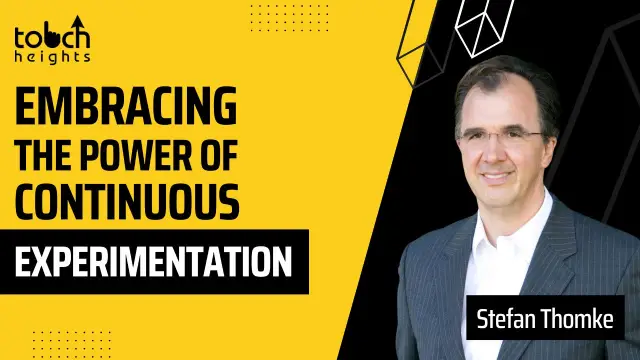Embracing the Power of Continuous Experimentation: An Interview with Stefan Thomke
In a rapidly evolving business landscape, organizations are constantly seeking ways to stay ahead of the curve and foster innovation. One approach that has gained significant traction is continuous experimentation. Stefan Thomke, a renowned expert on the subject, delves into the criticality of embracing experimentation and its impact on driving innovation in organizations. In an exclusive interview, Thomke shares insights on the paradoxical balance of success and failure, the significance of high-velocity incrementalism, the influence of human foibles on innovation, and the remarkable experimentation culture at Booking.com. He also highlights the key components of a large-scale experimentation system and the ethical responsibilities that come with its immense power.
The Engine of Innovation

Embracing Continuous Experimentation Thomke emphasizes that experimentation is the driving force behind innovation, enabling organizations to navigate the uncertainties that accompany the pursuit of novelty and value creation. With limited prior experience in uncharted territories, experimentation becomes the essential tool to test what works and what doesn’t.
Success and Failure

The Paradoxical Balance Thomke highlights the pivotal role of failure in the innovation process, as it provides valuable answers and insights. Distinguishing between failures and mistakes, he explains that failures, unlike mistakes, offer learning objectives and contribute to the iterative nature of experimentation. By embracing failure as an integral part of innovation, organizations can foster a culture of continuous learning.
High-Velocity Incrementalism

The Power of Small Changes While breakthroughs and disruptions garner significant attention, Thomke emphasizes the value of incrementalism, particularly in the digital realm. He introduces the concept of high-velocity incrementalism, emphasizing the need for organizations to iterate quickly and respond to feedback. Even small improvements, when rapidly implemented on a large scale, can lead to substantial revenue growth.
Human Foibles

Navigating Hubris and Bias Thomke explores how human tendencies, such as hubris and bias, can impede innovation. He highlights our inclination to rely on experience and expert opinions, often hindering our ability to embrace uncertainty. Drawing on behavioral research, he underscores the importance of experiments in countering these human weaknesses and fostering a culture of honesty and continual improvement.
Booking.com

A Case Study in the Experimental Mindset Thomke delves into the exemplary experimentation culture at Booking.com, where experimentation is democratized throughout the organization. He highlights how employees have the autonomy to launch experiments without seeking prior permission, fostering a dynamic environment of innovation and learning. Transparent peer review and the ability for anyone to halt an experiment ensure checks and balances within the system.
Large-Scale Experimentation Systems

Key Components Thomke discusses the essential elements of a large-scale experimentation system, emphasizing the significance of process, culture, and management. While companies like Booking.com developed their internal platforms, third-party tools now offer accessible alternatives. He outlines the “Seven S’s,” encompassing scale, scope, shared values, skills, standards, and support, as fundamental pillars of such systems.
The Responsibility of Experimentation

Ethical Considerations As experimentation gains prominence, Thomke highlights the importance of ethical considerations. Organizations must carefully evaluate the ethical implications of their experiments to avoid potential backlash. He advocates for a balance between empowering employees to run experiments at scale and ensuring thoughtful ethical judgment through systems such as training and clear guidelines.
The Path Forward

Innovation in Times of Crisis Addressing the challenges posed by the global pandemic, Thomke emphasizes that innovation and experimentation will play a pivotal role in navigating the crisis. Organizations must recognize the value of smart testing, which provides vital data for effective decision-making. He highlights the need for heightened awareness and investment in testing capabilities to drive economic recovery and bolster organizations’ resilience.
Stefan Thomke’s insights shed light on the significance of continuous experimentation in driving innovation within organizations. By embracing experimentation, organizations can navigate uncertainty, harness the power of failure, and foster a culture of continuous learning. Through high-velocity incrementalism, they can leverage small changes for substantial impact. However, with great power comes great responsibility, and ethical considerations must be at the forefront of experimentation efforts. Ultimately, organizations that invest in large-scale experimentation systems will thrive in an ever-evolving business landscape, propelling themselves ahead with innovative ideas and data-driven decision-making.
This article, featuring Thomke’s compelling perspective, was originally published in Rotman Management, the esteemed magazine of the University of Toronto’s Rotman School of Management. Rotman Management is widely recognized as a leading publication in the field of business management, offering thought-provoking insights and cutting-edge research to its readership. By drawing on Thomke’s expertise, this article contributes to the ongoing discourse surrounding innovation and the vital role that continuous experimentation plays in driving organizational growth and adaptability.
For more information and to access the original article, please visit the Rotman Management website at www.rotman.utoronto.ca/connect/rotman-mag.







